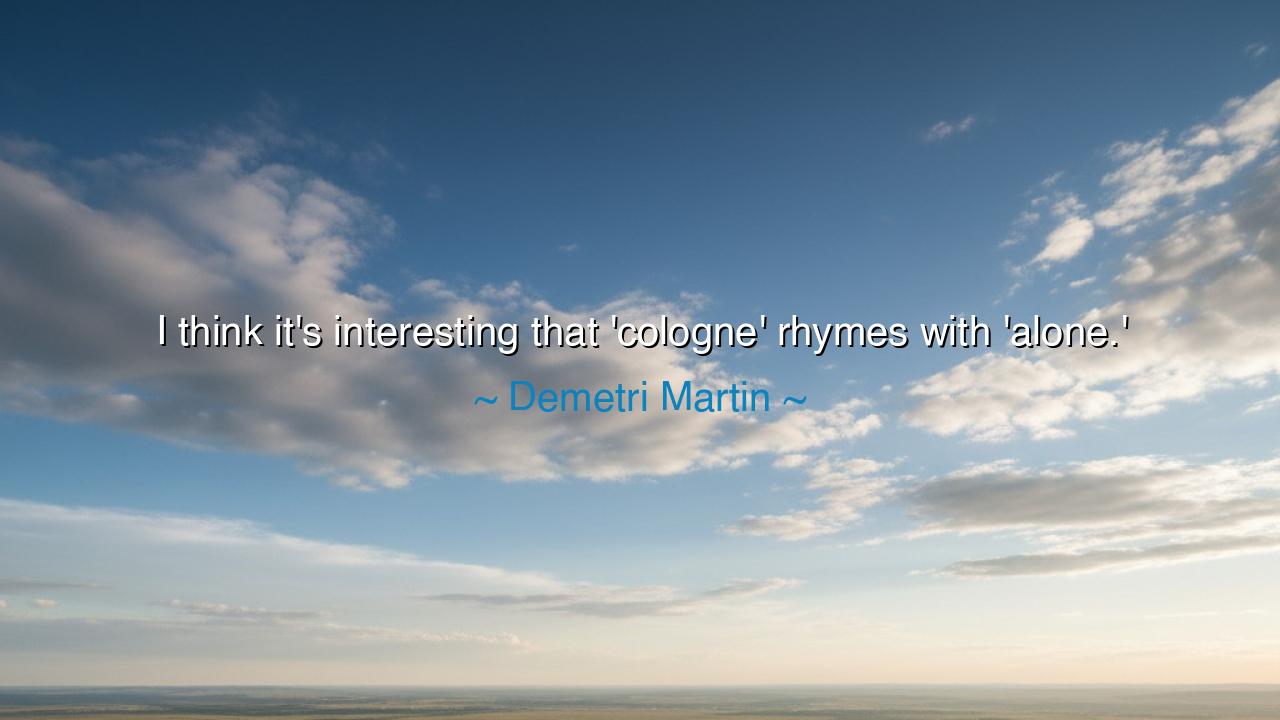
I think it's interesting that 'cologne' rhymes with 'alone.'






In a world often draped in masks and fragrances, Demetri Martin, with the wit of a jester and the insight of a philosopher, once said: “I think it’s interesting that ‘cologne’ rhymes with ‘alone.’” What seems at first a jest—a mere play on words—hides within it a quiet and piercing truth about the human heart. It is a whisper about the loneliness behind vanity, the solitude that lingers even when we seek to adorn ourselves for the world’s approval. With this small rhyme, Martin exposes a deep paradox: that in striving to appear desirable, we often drift farther from the authentic self that could truly connect us to others.
Cologne, the scent of confidence, the invisible garment of attraction, becomes here a symbol of all our efforts to conceal our fears and fragility. We wear it not only to smell sweet, but to mask the uncertainty beneath our skin. Yet “alone”, its echoing rhyme, reminds us that such coverings cannot bridge the distance between souls. The more one relies upon appearance, the further one may wander from truth—and thus from genuine closeness. In his playful observation, Martin touches the ancient tension between image and essence, between how we appear and who we are.
Throughout history, many have adorned themselves to seek belonging and admiration. Think of the courts of Versailles, where nobles powdered their faces and drenched themselves in perfume to hide the scent of decay—both literal and moral. Beneath their silk and scent, they were prisoners of appearance, chained to etiquette and envy. The palace glittered, but hearts starved. The air was fragrant, yet full of loneliness. So too in our time, though our perfumes are modern and our manners digital, the same hunger persists: the desire to be noticed, the fear of being unseen.
But there have been others—rare and luminous—who cast away the masks and chose authenticity over adornment. Vincent van Gogh, poor and misunderstood, painted not to please the salons of Paris, but to wrestle with truth and beauty as he saw them. He cared little for polish, for he sought not to charm but to reveal. Though the world mocked him, his soul found communion through his art. He was alone, yes—but his solitude was the price of honesty, and from it bloomed a fragrance more enduring than any cologne: the scent of truth.
Demetri Martin’s humor hides a lesson of self-awareness. When we seek to impress, let us ask—for whom do we adorn ourselves? If our purpose is love, let it be love born of truth, not of illusion. For the sweetest fragrance fades, but character endures. When the scent wears off and the costume is set aside, only the authentic self remains. That is the one capable of being known, and of truly knowing others. It is far better to stand bare and real than perfumed and hollow.
The wise of old taught that beauty is not in the decoration but in the harmony of the soul. To walk in honesty, to embrace one’s own imperfections, is to offer the world a truer perfume—the aroma of sincerity. This, too, is what Martin’s jest reveals: that to seek love through artifice is to court loneliness, but to seek love through truth is to find belonging. The two rhyming words, “cologne” and “alone,” are not merely a joke—they are a mirror, reflecting the fragile dance between our desire to be loved and our fear of being seen as we truly are.
So let this be your lesson, O listener: wear what pleases you, but let your truest fragrance be your heart. Let kindness be your scent, humility your adornment, and truth your invisible crown. Do not fear to be seen as you are; those who love you for your essence will never turn away. For when you cease to perform and begin to be, you will find that you are no longer alone—and even without cologne, your presence will linger sweetly in the lives you touch.






AAdministratorAdministrator
Welcome, honored guests. Please leave a comment, we will respond soon